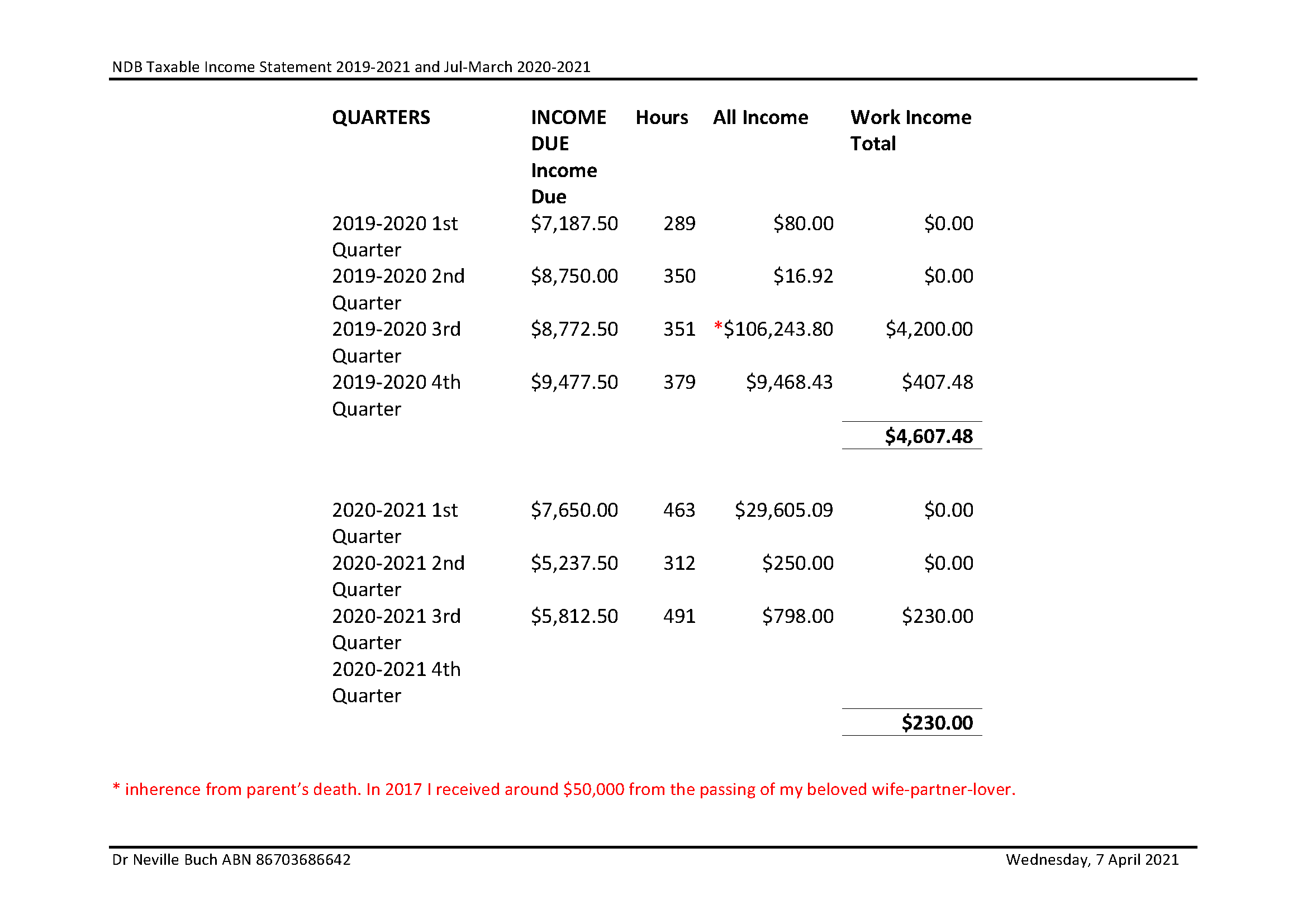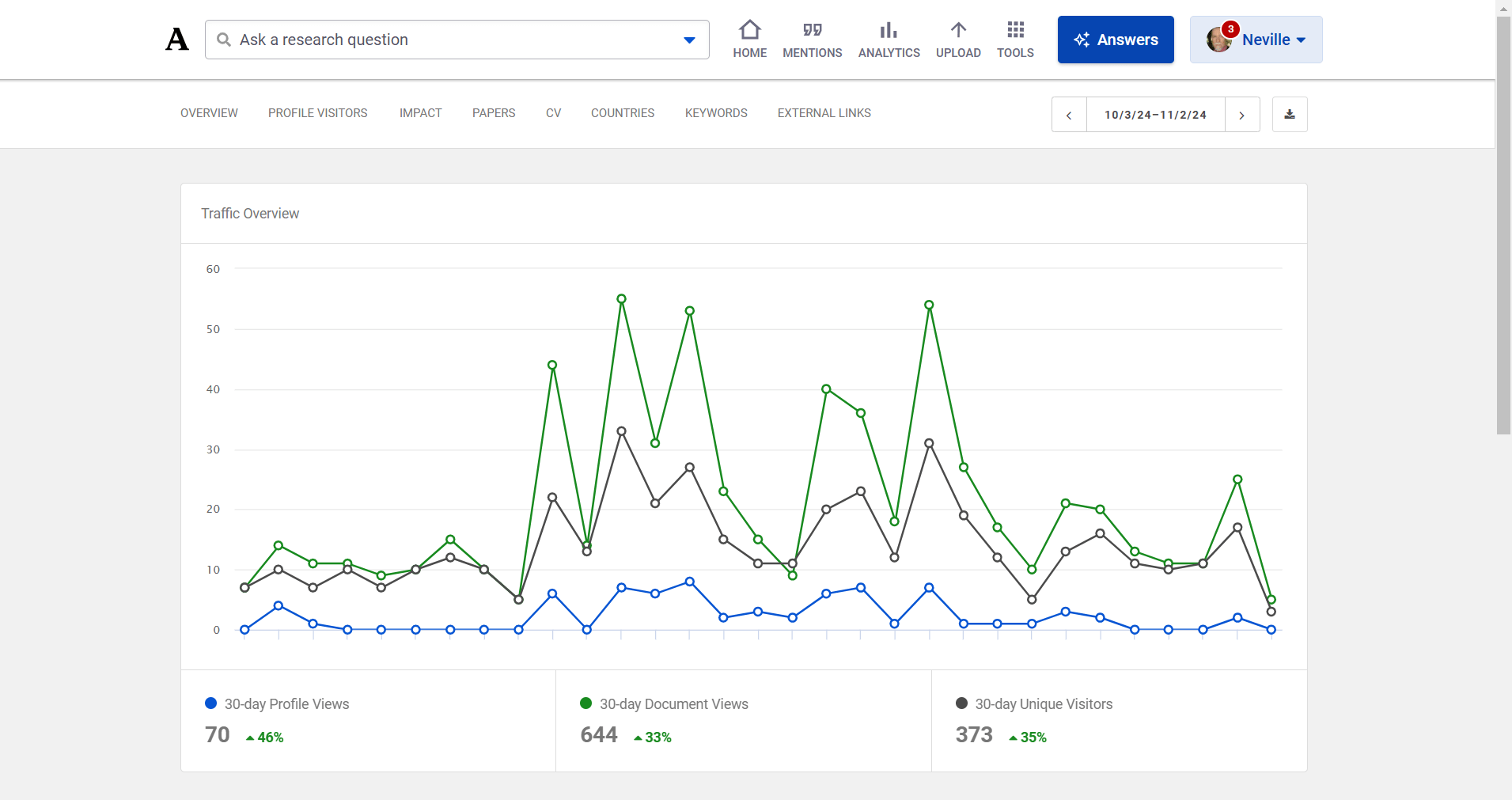Dr Buch’s Historiography as Business. It is Dr Neville Buch ABN: 86703686642. It is a Not-For-Profit business. Income is to sustain the business. What the general population does not understand is the cost to the professional historian. To take my best example:

NDB Taxable Income Statement 2019-2021 and Jul-March 2020-2021
I have not been paid for a formal contract since late 2017. The income 2019-2021 was the non-profit investment into my business. What it demonstrates over the life of the business, since 2009-2010, is that the average annual cost for the business has been $4,000-$5,000 which is the average cost of paying a contract. One quarter for the not-for-profit business, to be sustainable, would be a few hundred dollars.
This is the financial report. Unfortunately, as a general truth, most businesses priorities the finances above the quality of the product, and, furthermore, most businesses considered the product as bullshit thinking (yes, a thing), when the thinking on the product challenges the finances. Where’s the evidence? See the bibliography. However, just on a personal positioning: the question is why have not I had a contract since late 2017? I am saying that the Australian demography is against me. For evidence for this argument. see https://drnevillebuch.com/news/
IMPACT
My sound, but radical, argument is that the over-prioritizing finances does not determine 1) quality of the product (scholarship, history, in this case), 2) fair pay, and 3) what the common person calls, “reality.”
My daily writing is in the main blog articles and essays. The below image is a measure of my impact from one of two major blogging platforms, as of November 1, 2024. I have three more platforms I regularly use. In academia.edu I have just reached an international audience of over 7000 persons, with nearly 3000 persons highly engaged. I average 2-3 scholarly blogs a week.
When I started my career with an honours’ thesis, it was attitudes in Queensland history I was examining. My doctorate extended the examination with philosophical valuations in common life. My commitment to intellectual history has always reflected the same commitment to public history. There is significant pressure on the history industry to change its attitude. Money does speak for a period of time. Business contractors can work on the principle of who “calls the piper pays the tunes”, and attempt to skew the histories. But as Abraham Lincoln said, “You can fool some of the people all of the time, and all of the people some of the time, but you can not fool all of the people all of the time.” There are early signs that the history industry is coming out of a slumber, and hopefully return (somewhat close) to the golden age of Australian history in the 1970s and 1980s. Spiral Historiography.
BIBLIOGRAPHY
Anwar, J., Shah, S., & Hasnu, S. (2016). Business Strategy and Organizational Performance: Measures and Relationships. Pakistan Economic and Social Review, 54(1), 97–122. https://www.jstor.org/stable/26616701
Bamberger, K. A., & Lobel, O. (2017). Platform Market Power. Berkeley Technology Law Journal, 32(3), 1051–1092. https://www.jstor.org/stable/26488977
Berry, S., Gaynor, M., & Morton, F. S. (2019). Do Increasing Markups Matter? Lessons from Empirical Industrial Organization. The Journal of Economic Perspectives, 33(3), 44–68. https://www.jstor.org/stable/26732321
Brennan, M. J. (1995). Corporate Finance over the Past 25 Years. Financial Management, 24(2), 9–22. https://doi.org/10.2307/3665531
Cook, A., & Glass, C. (2015). Do minority leaders affect corporate practice? Analyzing the effect of leadership composition on governance and product development. Strategic Organization, 13(2), 117–140. https://www.jstor.org/stable/26478206
Eid, R., Elbeltagi, I., & Zairi, M. (2006). Making Business-to-Business International Internet Marketing Effective: A Study of Critical Factors Using a Case-Study Approach. Journal of International Marketing, 14(4), 87–109. http://www.jstor.org/stable/25049066
Einav, L., & Levin, J. (2014). The Data Revolution and Economic Analysis. Innovation Policy and the Economy, 14(1), 1–24. https://doi.org/10.1086/674019
Esty, D. C. (2017). Red Lights to Green Lights: From 20th Century Environmental Regulation to 21st Century Sustainability. Environmental Law, 47(1), 1–80. http://www.jstor.org/stable/44219037
Filatotchev, I., & Nakajima, C. (2014). Corporate Governance, Responsible Managerial Behavior, and Corporate Social Responsibility: Organizational Efficiency Versus Organizational Legitimacy? Academy of Management Perspectives, 28(3), 289–306. http://www.jstor.org/stable/43822069
Ghemawat, P. (2002). Competition and Business Strategy in Historical Perspective. The Business History Review, 76(1), 37–74. https://doi.org/10.2307/4127751
Khan, L. M. (2019). The Separation of Platforms and Commerce. Columbia Law Review, 119(4), 973–1098. https://www.jstor.org/stable/26632275
Mithas, S., Tafti, A., & Mitchell, W. (2013). How a Firm’s Competitive Environment and Digital Strategic Posture Influence Digital Business Strategy. MIS Quarterly, 37(2), 511–536. http://www.jstor.org/stable/43825921
Mok, K. H. (2000). Impact of Globalization: A Study of Quality Assurance Systems of Higher Education in Hong Kong and Singapore. Comparative Education Review, 44(2), 148–174. https://doi.org/10.1086/447601
Oh, W., & Pinsonneault, A. (2007). On the Assessment of the Strategic Value of Information Technologies: Conceptual and Analytical Approaches. MIS Quarterly, 31(2), 239–265. https://doi.org/10.2307/25148790
Omagu, D. O. (2012). State, Politics, and Globalisation. Journal of the Historical Society of Nigeria, 21, 70–98. http://www.jstor.org/stable/41857190
Walker, O. C., & Ruekert, R. W. (1987). Marketing’s Role in the Implementation of Business Strategies: A Critical Review and Conceptual Framework. Journal of Marketing, 51(3), 15–33. https://doi.org/10.2307/1251645
Featured Image: Dr Neville Buch with Fryer Manager Simon-Farley at the Geopoetry Talk University of Queensland (QU), 30 October 2018.

Neville Buch
Latest posts by Neville Buch (see all)
- Anticipation of a better locally-regionally world, globally conceived - November 22, 2024
- Free Thinker Institute (FTI) Stoa: Aligning Judgment with Virtue (HYBRID) - November 21, 2024
- How Small is Australian Higher Education Sector for Domestics? - November 20, 2024

